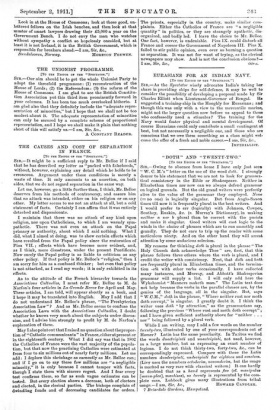" DOTH " AND " T WENTY-TWO."
[TO THE EDITOR OF THE "SPECTATOR."] Sin„—Owing to absence from home I have only just seen " W. C. M.'s " letter on the use of the word doth. I strongly demur to his statement that we are not to look for gramma- tical consistency in the Bible or Shakespeare. Neither in Elizabethan times nor now can we always defend grammar on logical grounds. But the old grand writers were perfectly alive to the value of the grammar they employed. None (= no one) is logically singular. But from Anglo-Saxon times till now it is frequently plural in the best writers. And I would prefer to err (logically) with Johnson, Cowper, Southey, Ruskin, &c. (v. Murray's Dictionary), in making neither a nor b plural than be correct with the purists and make it singular. Good writers will cast logic to the winds in the choice of phrases which are to run smoothly and grandly. They do not care to trip up the reader with some meticulous nicety. And on the other hand they will arrest attention by some audacious solecism.
My reasons for thinking cloth is plural in the phrase " The Holy Church doth acknowledge Thee " are, first, that this phrase follows three others where the verb is plural, and I credit the writer with consistency. Next, that cloth. and ha& are frequently plural in Elizabethan times, and the termina- tion -eth with other verbs occasionally. I have collected many instances, and Murray, and Abbott's Shakesperian grammar will supply a list. I will only add here the Wykehamist "Manners maketh man." The Latin text does not help because the verbs in the parallel clauses are, by the genius of the language, all in the singular. But, says " W.C.M.," cloth in the phrase, " Where neither rust nor moth doth corrupt," is singular. I greatly doubt it. I think the writer uses cloth " by attraction," as the grammarians say, following the previous "Where rust and moth doth corrupt" ; and I have given sufficient authority above for "neither . . . nor" being followed by a plural verb.
While I am writing, may I add a few words on the number twenty-two, illustrated by one of your correspondents out of Homer? Latin has the same peculiarity. In Taritus we find the words duoetviginti and unaetviginti, not used, however, as a large number, but as expressing an exact number of
legions. I do not think thirty-two, forty-two, &c., can be
correspondingly expressed. Compare with these the Latin numbers duodeviginti, undeviginti for eighteen and nineteen. (Livy uses the numbers octodecim, novenidecim, but the usage is marked as very rare with classical writers.) It can hardly be doubted that as a hand represents five (cf. manipulua [manit-pleo], mantissa), so twenty is represented by the com- plete man. Lubbock gives many illustrations from tribal usage.—I am, Sir, &c., HOWARD CANDLER. 7 Briardale Gardens, Hampstead.






































 Previous page
Previous page